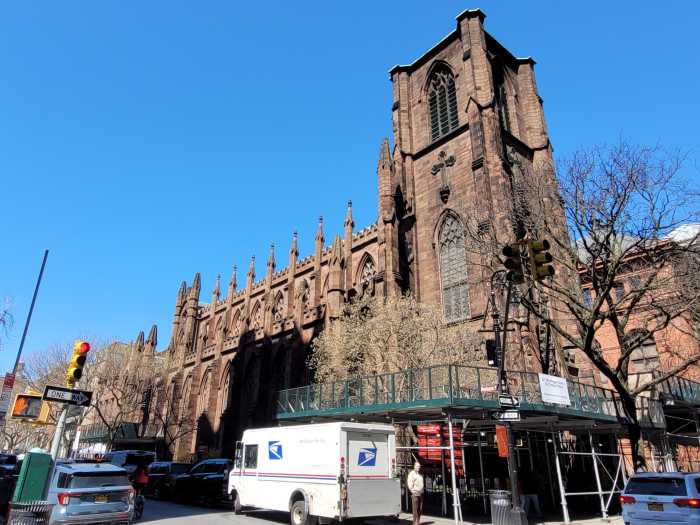Dignity law offers protections for sexual orientation, gender identity
At the end of a day when a long-stalled LGBT rights initiative suddenly jumped to the front of the line, the New York State Senate on June 22 passed the Dignity for All Students Act (DASA).
The anti-bullying measure, already approved by the Assembly and supported by Governor David Paterson, provides protections based on a number of categories, including sexual orientation and gender identity.
The late evening vote — approval came just after 10 p.m. — was 58-3, with all three no votes coming from Republicans.
The ayes, surprisingly, included Bronx Democrat Ruben Diaz, Sr., a fiery anti-gay Pentecostal minister, who has been the LGBT community’s political bête noire for nearly two decades.
DASA represents the first time that the Senate has approved any legislation making reference to gender identity. Yet, just two weeks after the Senate Judiciary Committee rejected the Gender Expression Non-Discrimination Act, in a 12-11 nearly party line split (with Diaz joining the Republicans in voting no), the inclusion of gender identity in the legislation elicited no comment at all during the floor debate.
The Assembly had approved the measure in each of seven successive sessions, but the Senate had to date refused to take up the matter.
“We thank the Legislature for passing the first-ever state law that includes protections based on gender identity and expression,” said Ross Levi, the new executive director of the Empire State Pride Agenda, in a written statement released right after the vote. “This significant law will now protect some of our community’s most vulnerable members — transgender youth for whom unsafe schools can be the beginning of a lifetime of marginalization that can include health issues and even homelessness… We also thank the lead sponsors of this legislation, Assemblymember Daniel O’Donnell and Senator Tom Duane for their perseverance in getting this bill passed.”
In a press conference with more than a dozen of his colleagues the morning after the vote, Duane, an out gay Chelsea Democrat, said, “Once Dignity is enacted, it will be the first time protections for our transgender community will be enshrined in New York law. Dignity is a victory for all school families and is yet another step in the fight for safety and equality for all New Yorkers.”
Brooklyn’s John Sampson, the leader of the majority Democratic Conference in the Senate, said, “I applaud Senator Duane for addressing this very serious problem and standing up against discrimination and bullying for our young people.”
In a written statement, O’Donnell, who is also gay and represents the Upper West and Harlem, said, “Too many students are bullied based on real or perceived differences with their classmates. Every student deserves an environment free of harassment and discrimination, an environment that allows every child to reach his or her full potential.”
Upper West Side Democratic Senator Eric
Schneiderman, a candidate for state attorney general, released a statement in the immediate aftermath of the vote, saying, “It sends a strong message that every student in New York State will be treated equally, and with the respect they deserve. And for the first time in history, protections based on gender identity and expression will be included in state law.”
The final lap toward victory for DASA emerged suddenly, when, amidst all the budget chaos gripping Albany, the measure, early in the afternoon on June 22, was put on the calendar for consideration by the Rules Committee, the final step before floor debate. Less than ten hours later, the bill was approved overwhelmingly.
Four days earlier, key New York City officials, including Schools Chancellor Joel Klein, Council Speaker Christine Quinn, and Council Education chair Robert Jackson, sent each of the 62 senators a letter urging them to support the bill, saying, “A school environment free of bullying and harassment is essential to the academic success of every child… This law would help ensure that our schools are places in which every child can fulfill his or her academic potential.”
In 2004, the Council passed, over Mayor Michael Bloomberg’s veto, a similar measure, but the administration refused to implement it, citing its executive prerogatives, an argument the Council declined to challenge in court.
Under Klein’s leadership, however, the school system has implemented the Respect for All program, which it says achieves the law’s goals of addressing bias-related harassment and bullying in the schools.
In a written release, the Transgender Legal Defense and Education Fund praised the Senate for its vote, noting the historic inclusion of the gender identity category in the bill, and pointing to a recent survey from the Gay, Lesbian and Straight Education Network (GLSEN) that found that 79 percent of New York’s LGBT school students reported harassment over the past year due to their sexual orientation and 62 percent because of how they expressed their gender.
The Dignity for All Students Act Coalition — a group that includes ESPA, GLSEN, the Anti-Defamation League, the New York Civil Liberties Union (NYCLU), and NYSUT, a federation of local unions representing more than 600,000 teaching professionals — said that DASA “will protect children from pervasive bullying and bias-based harassment in the state’s public schools.”
“This is a major victory for children, parents, and educators across the state,” said Donna Lieberman, NYCLU’s executive director. “With this vote, the State Senate has empowered New York’s educators to fulfill their responsibility to provide all students a safe, nurturing learning environment.”
































